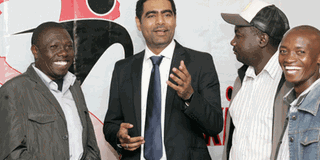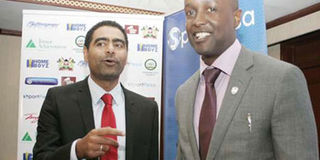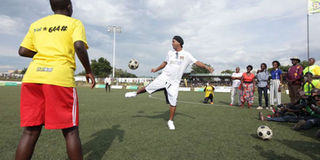Super 8 League founder Mohammed wants Kenyan sport given more respect

Extreme Sports CEO Hussein Mohammed (second left) shares a light moment with Super 8 tournament club's representatives Jeremiah Nyagah of Dagoretti Santos (left), Dickson Onyango of Babadogo FC (second right) and Meshack Onchango of Kangemi's Red Carpet FC after the launching of Extreme Super 8 soccer tournament on February 3, 2015. PHOTO | CHRIS OMOLLO |
What you need to know:
- ‘Priority in budgetary allocations goes to Education, Health, Security and others and we have generally failed to see the importance of sports development’
Hussein Mohammed was born to inspire.
That's the opinion I formed after spending time with him and listening to him for about an hour.
“Just look outside David,” he directs me in the middle of this interview, whilst also pointing and gazing in the same direction from inside his simple but elaborate office in Kilimani, Nairobi.
Following his pointed finger, I look out from the second floor window and notice the lush greenery dotting the area courtesy of the recent rains, leaves bustling on the tall trees that dot the surroundings amid a warm breeze in the gentle city sunshine.
Further below, a few people are going about their businesses in the hustle and bustle of the city.

Extreme Sports boss Hussein Mohammed (left) and Sportpesa CEO Ronald Karauri at a past event. PHOTO | FILE | NATION MEDIA GROUP
The Wednesday evening is gradually replacing the afternoon and this, by all standards, is a calm day in the capital.
“You see,” he continues.
“All that (you see) is a blessing to you. I know you know of several other places in this world where things are not all right. Places where citizens cannot walk because of insecurity, fear of a terrorist attack, or even unfavourable weather. That's why I always tell people they need to appreciate what we have here in Kenya.”
Inside his office, a giant painting of Mohammed, who serves as Humora Holdings Executive Chairman whilst also making time to support Gor Mahia football club in the Kenyan Premier League, immediately grabs my attention.
There are many photos in the office, including one where his younger version stands in a queue of youth leaders and politicians awaiting former President Mwai Kibaki’s handshake.
A handful of trophies are displayed atop a drawer to his left with neatly arranged books.
At just 41, Mohammed, a businessman and entrepreneur, isn’t only inspiring me. Humora Holdings has extensive interests in renewable energy, consultancy, agribusiness and sports management.
It is in sports management where a vehicle named Extreme Sports has been used to positively affect the lives of thousands of youngsters who would otherwise be wasting away in Nairobi’s middle-income residential areas.
Via Extreme Sports, Mohammed has — over the past decade and a half — been concentrating on building the increasingly popular Super Eight tournament which takes place annually in Nairobi.
This competition consists of a three-tier annual grass roots football leagues made up of 100 teams and 2,500 footballers, most of them aged below 25.
Former Harambee Stars midfielder Innocent Mutiso and Jerry Santos are perhaps the most successful graduates from this tournament. Recently, the amateur tournament received thumbs up from a special guest all the way from Brazil in the frame of former Ballon d’Or winner Ronaldinho Gaucho. In a historic visit, Ronaldinho graced the Super Eight Champions League final and watched Jericho AllStars defeat Technical University of Kenya 2-1.

Brazil legend Ronaldinho Gaucho (left) hands over the Super 8 Champions League trophy to Jericho All Stars FC captain Dismas Buggy (centre) as Betika CEO Rupen Samani looks on at Camp Toyoyo Grounds on November 11, 2018. PHOTO | KANYIRI WAHITO |
“This is the future of Kenyan football, you have to keep putting in this effort and nurture the talents,” the former Barcelona player explained, with his trademark smile.
“I am really satisfied this platform has created thousands of jobs mainly for service providers.
“In the past few years, we have had over 20 players moving to bigger clubs in the National Super League and Kenyan Premier League from previous league seasons and hoping more shall follow suit. Besides playing, our clubs undergo financial literacy courses which enable them to learn basic management skills.” Mohammed adds.

Brazilian football star Ronaldinho Gaucho juggles the ball alongside Ivy Chepkirui, a student at Nyakach Girls High School at Moi Stadium in Kisumu on November 11, 2018. PHOTO | TONY OMONDI |
Mohammed's journey includes stints as head of Sales at Safaricom, Director of Operations during the 2013 Kenya @50 celebrations, Chairman of Youth Agenda, an NGO which aims to empower and nurture youngsters, and also Chairman of the Harambee Stars Management Fund back in 2010.
From this background, he believes Africa needs to do much more to not only develop and professionalise sports.
“We haven’t fully appreciated the potential of sports (in Africa),” he explains. “(Our) athletes struggle to secure endorsement deals and very few credible sports marketing firms exist within the region.
With the Africa continental free trade area becoming a reality, players in the sports sector should prepare adequately and take full advantage of the opportunities presented by improved cross-border trade policies.
There is no reason, for example, why we shouldn’t be able to host major intra-African games across various disciplines or produce authentic sports-related merchandise for consumption within the African continent.
LOST TO NYAMWEYA
The notable setback of what has been a successful sports career for Mohammed was when he unsuccessfully vied for the Football Kenya Federation (FKF) presidency in 2011, with Sam Nyamweya emerging winner.
That aside, football stakeholders would ideally appreciate if Mohammed and current FKF office led by Nick Mwendwa would harmonise their operations to improve standards of football in the country. Sadly, this has, however, not been the case.
Instead, reports of frosty relationships exist between the pair characterised by occasional legal battles. In fact, several times in the past, Mwendwa has publicly vowed not to recognise Mohammed’s football leagues.
“I am least interested in getting involved in wrangles and football politics. That is what destroyed Kenyan football in the first place. Extreme Sports is a professional sports management company registered under the Companies Act and runs a private amateur league.
“Some people choose to play association football and others opt for private leagues. It happens all over the world. We welcome anyone interested in participating in ours,” he said.
That said, Mohammed is keen to congratulate the men’s national football team following their recent qualification to next year’s Africa Cup of Nations for the first time in 15 years and urges the government and corporates to stand by the players and coaches. He also lauds his favourite team Gor Mahia and Kariobangi Sharks — the latter an outfit that cut its teeth in the Super 8 tournament — for their respective exploits on the continental scene.
Sharks and K’Ogalo were yesterday eliminated in preliminaries of the Caf Africa Confederation Cup and Champions League respectively.
“Participating in the Africa Cup of Nations is a big deal and I am proud of our national team. As the former chairman of the Harambee Stars Management Fund, I appreciate the challenges the team may be facing in preparation for the upcoming tournament and urge that measures are put in place to ensure the players only focus on the games ahead,” he offered.
In the same breath, Mohammed also urges the government to do much more to support sports in the country.
He says: “Historical perceptions and attitude towards sports led to the marginalisation of industry players and related government departments. Ministry of Sports has never got the respect it deserves.
“Priority in budgetary allocations goes to Education, Health, Security and others and we have generally failed to see the importance of sports development,” he observed.
“Sports is the perfect tool for uniting society, for encouraging a healthy lifestyle which ultimately reduces our healthcare bill.
“Sports creates jobs for the youth and reduces crime rate within communities. Sports teaches us patience, resilience, tolerance, while making us progressively competitive,” he continued.
The future of sports in Kenya is bright, believes Hussein even as he sees me off to the door of his office. With such inspiration from a knowledgeable chap, it's hard to argue.
“It is a critical component in our social fabric. Unfortunately, sports also suffered a bad reputation due to mismanagement, infighting, corruption and lack of accountability but this can be corrected with time,” he concluded.





